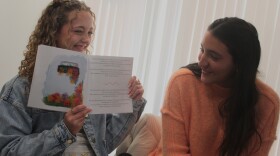After winning the “Best Comedy” award at last year’s Melbourne Fringe Festival in Australia, New Hampshire native Gemma Soldati and comedy partner Amrita Dhaliwal are now taking their two-woman clown show,The Living Room, on the road. The show, which they describe as “a comedy about death, devised in grief,” will be touring major cities across the United States, Canada, and Australia.
The duo will be kicking off their world tour this Saturday at the Music Hall in Portsmouth. They sat down with NHPR’s Peter Biello to tell him more about how they turned tragedy into comedy.
Editor’s note: This transcript has been lightly edited for clarity.
Biello: So when people think about clowns, they think about, you know, the funny noses, the makeup, the giant red shoes, the clown coming out of a very tiny car.
Soldati: Right.
Biello: This is not that.
Soldati: We don't even have a car.
Dhaliwal: You'll be sadly disappointed if that's what you're expecting.
Biello: So what makes a clown a clown, then, if it's not that?
Soldati: Million dollar question.
Dhaliwal: Yeah. And also we should answer, but we can tell you now that every person who identifies as a clown will probably answer this differently.
Soldati: But there's many traditions. So there's obviously the circus clown, which I think Americans are most familiar with and would think of when we say clown, or taking that out really far, they're thinking of all the sort of horror films that now use clowns and people being afraid of clowns.
Dhaliwal: Or the birthday clown that comes from the American circus.
Soldati: Yeah, but the tradition that we are both trained in is more a sort of European, coming from commedia dell'arte style, and really just playing a lot with the archetype of the clown, the sort of innocent, maybe like lower class, sometimes like, you know, playing with status, you know, kind of bumbling, sometimes failing, really embodying the humanity in the folly.

Biello: And tell us about The Living Room a little bit, because it's funny, but it's dealing with a heavy subject-- death. Would you like to say something, Gemma?
Soldati: So the living room is... we call it a comedy of grief, much like, you know, a comedy of errors before us. And it was born out of our lived experiences with grief and loss in both of our lives. But the show... we were just really interested in the clown being the sort of messenger to tell the tales of grief and loss, because we have found such levity and absurdity and chaos and tragedy through our experiences. So we felt the clown to be the best messenger for this show.
Biello: And how would you describe the result of that, Amrita? A clown being a messenger of a story about death, essentially?
Dhaliwal: It's perfect, I think, because in a way the clown has an innocence. And where they hold sacredness is around the simplicity of things. And so we're never making fun of death. We're really playing with the real dynamics of death, how we dress in black, how maybe we don't have ritual around it, and we just play with all these different themes.
Soldati: Yeah, this is why we're not just clowns who are like, oh, we're just gonna, you know, I don't even know—
Dhaliwal: —Juggle.
Soldati: Juggle. We know a lot of wonderful jugglers and they're just talented people. But like, no shame to jugglers.
Dhaliwal: I love jugglers.
Soldati: We love it. We're starting juggling, actually.
Dhaliwal: I can juggle.
Soldati: But to say that, like for us, I think both of us were drawn to clown, not just because it was comedy, but because there was potential to have deep, deep meaning and purpose of the clown.

Biello: Mm-hmm. Clowning, as far as I can tell...has it been a male dominated space?
Dhaliwal: Yes.
Soldati: Say it girl.
Biello: To put a fine point on it, yes, it has. Okay, so what's it been like for you two as women to break out and get some attention for your show?
Soldati: I would say it's been quite a journey. I mean, we have been fortunate of having wonderful support from the community in Los Angeles where we started devising the show. But of course, as with almost any industry, the main sort of gatekeepers, the main teachers have predominately and historically been male. But we've been fortunate that some of our counterparts have really supported our work. And what we've noticed actually through the process of devising the show, self-producing the show, going to festivals, it was largely other women who would see the show and be like, what's going on? Who are you guys? How can I help? It's like really everywhere we went, whether it was like Vegas, Edinburgh, Hollywood, Melbourne, everywhere we went, it was other women, female artists, people in positions of power to help us who were like, what can I do? How can I support you?
Dhaliwal: Yes. And I will say that often in the space of clown shows that they have no depth and they have no meaning. But I think our particular experience in the world, in the cavities in which we have come into, we're never going to take the stage without having something... something pushing us or something to say. And it was always strange to me that the clown, which is such a powerful medium, like that people weren't playing with the potential of death. Like that you weren't coming to the stage to have something to say. So I really, really believe that like we're needed and that there will be many after us. And it's important for women to see women on stage.








